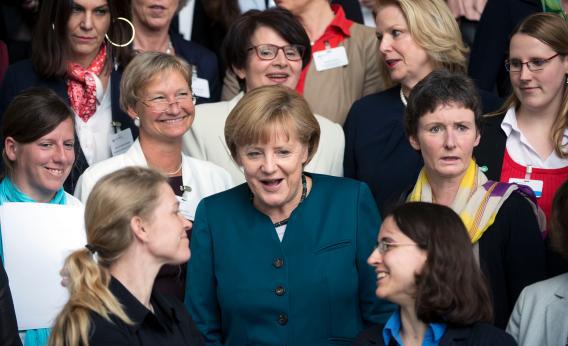Germany has an election coming up in September, which could be critical to the future of the eurozone as economic problems appear to be afflicting even Germany at least a little bit. But a word of caution: Due to the nature of the German electoral system, and the relatively nonpolarized nature of German politics, you need to be careful when you read a German election poll.
Formally speaking, what’s going on is that Merkel is running as the chancellorship candidate of a coalition of Christian Democrats and Free Democrats against an implicit opposition coalition of Greens and Social Democrats. But what’s really happening is considerably more complicated, and a crucial fact is that parties pay a large penalty if they fall below the 5 percent electoral threshold for proportional representation.
In particular, the Free Democrats are unpopular and hovering right around the 5 percent line, while the Christian Democrats are far outpolling any other party, so Merkel will lead the next government. The main question is, who will her coalition partner be? If Christian Democratic voters want a right-wing government, a critical mass of them need to vote tactically for the Free Democrats. There’s been evidence of that happening in some German state elections. But some Christian Democratic voters may prefer to see Merkel govern in a grand coalition with the Social Democrats or even experiment by sitting in a coalition with the Greens. Indeed, it’s far from clear that Merkel herself actually wants to “win”—she did quite well in a previous grand coalition and is from the moderate wing of her party. German politics is not polarized like American politics, so a coalition across ideological camps can do lots of productive governing. The parties that have trouble working together are the far-left Die Linke party and the center-left parties, which means that the existence of a strong Die Linke protest vote makes it very challenging for the center-left to obtain a majority.
Last but by no means least, a new euroskeptical party, the Alliance for Germany, is gaining some steam. If it clicks up another percentage point or three in the polls, it’ll get above the 5 percent threshold and upend the parliamentary math. Tactical considerations matter here, too. The Free Democrats are the more euroskeptical party in the current coalition. If their voters defect to a new, more euroskeptical party, that could push the FDP below the threshold and lead to a less euroskeptical coalition governing in Berlin. Perhaps that’s a risk euroskeptical Germans want to take, or perhaps they’ll swallow their principles and cast the FDP vote that maximizes the odds of euroskeptical policy being enacted.
